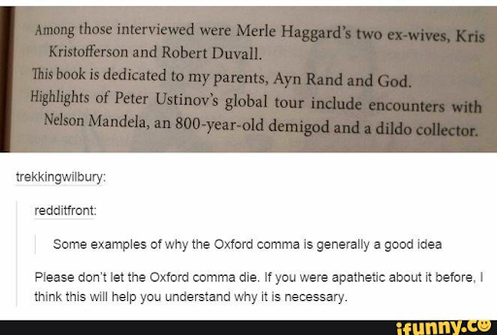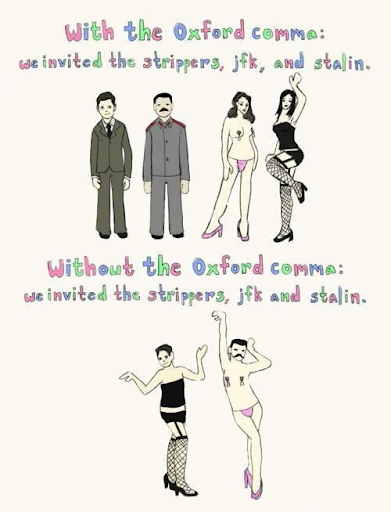|
First things first—let’s make sure we’re all on the same page about the Oxford comma.
So, what is it? According to Webster’s, the Oxford comma, sometimes called the serial comma or the Harvard comma, is a comma used to separate the second-to-last item in a list from a final item introduced by the conjunction and or or.
Which American style guides support the Oxford comma?
Because AP style is used by journalists, there’s a real space-saving mentality. So, in an effort to pack in more news per square inch, the Associated Press and journalistic style guidelines advise against using the Oxford comma. To be very clear, here at Wildling, we’re huge supporters of the Oxford comma. It’s true, though, we also love concision, so AP’s reasoning isn’t totally bonkers to us. However, their reasoning falls apart when concision hampers clarity. For instance:
See? No Oxford comma = chaos. CHAOS.
Still not convinced? You may concede that there are times when the lack of an Oxford comma could lead to ambiguity, but the frequency of misinterpretation is just not high enough to worry about the little guy. Well, I’d argue that the clarity an Oxford comma provides is essential—even lucrative, according to a judge. Hear me out: Three drivers sued Oakhurst Dairy for four years’ worth of overtime pay that they said they had been denied. Maine law requires time-and-a-half pay for each hour worked after forty hours, but the following were listed as exceptions to that rule: The canning, processing, preserving, freezing, drying, marketing, storing, packing for shipment or distribution of: Agricultural produce; Meat and fish products; and Perishable foods Without the Oxford comma, the line “packing for shipment or distribution,” could be referring to packing and shipping as a single act or as two separate tasks. The drivers argued that the line reads as a single act, and since they didn’t actually do any packing, they shouldn’t have been exempt from overtime pay. In the end, Oakhurst Dairy agreed to pay $5 million to the workers! Need I say more? by Grace Ball
0 Comments
Leave a Reply. |
How Do I Book?We'll try to find the answer to that question in our blog. Archives
August 2023
Categories
All
|





 RSS Feed
RSS Feed